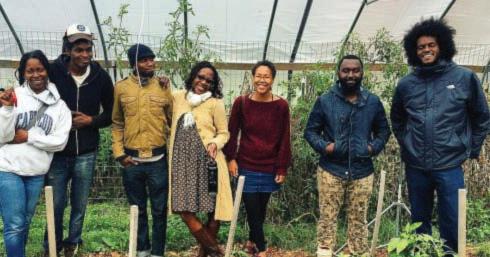
2 minute read
Our Methodology
Afroecology
Building trust is one of the things we often struggle with in this society. The agroecology encounters are a space to feel safe and build trust. Oftentimes, after ending an agroecology encounter and going back to your daily routine, it can get frustrating. You might feel like you’re alone in this process. But after going to these encounters, for me, they have helped me to re-energize myself, re-center myself, and to think strategically about this process of creating change. I think they are really important spaces for encouraging interaction among different communities who face the same struggles, who can come together and work together to build a great movement. Building trust is really important in this process.
— Kathia Ramirez
The Farmworker Support Committee (United States)
Our methodology is grouped into three areas: (i) political education through collective study, debate and analysis of socio-economic conditions; (ii) technical training through collective work, hands-on and shared knowledge; (iii) cultural expression through dialogue, intercultural exchange and mística (cultural ritual or ceremony); and (iv) internationalism by building a shared analysis with others globally. In our view, the organization of “encounters” creates the conditions to build a shared analysis, forge stronger relationships and promote mutual learning. The encounters require organization. Therefore the first step is to organize a political education group or the Political Pedagogical Coordination.
Massifying agroecology has to be related to people’s personal experience. Oftentimes people’s personal experiences are informed by their cultural and larger group experience. Within the context of agroecology we [in African American communities] felt like we had to create Afroecology as a key priority. Then we had to ground it in the Black agrarian experience. There is already a legacy and tradition that needed to be tapped into for agroecology to be of any relevance to Black farmers or to Black people, period. With Afroecology we could intelligently and with power participate in a broader social movement around agroecology.
— Blain Snipstal
Small-scale farmer and natural builder, Black Dirt Farm Collective (United States)
The Political Pedagogical Coordination (or PPC)
The Political Pedagogical Coordination (or PPC) is a collective composed of representatives of local organizations and allies as observers and supporters. The PPC takes responsibility for coordinating the overall process and activities of the encounter. The PPC members are tasked with developing the political and technical content of the activities that happen within the encounter. The first task of Political Pedagogical Coordination is to build relationships among facilitators and allies to help develop a shared understanding of the process.
As part of this initial step, a few things to consider are:
Practice “contextual analysis” to develop a collective understanding and analysis of our current conditions among participants. Contextual analysis (defined in the following pages) is a political education tool that deepens our understanding of the reality and history of our struggle. For this task, we usually invite participants who have done it before to demonstrate how it is done.
We develop a framework for organizing the encounter that is grounded in the struggles and experiences of the community with whom we are organizing. For instance, in the U.S. Northeast, Nipmuc tribal members organized an in-person meeting that included a conversation on food sovereignty and a formal request to the local tribal leadership. In the U.S. Mid-Atlantic, African American organizers developed the Afroecology encounter as their local framework (see side-box) in preparation to the regional encounter.
We practice the methods so all facilitators become familiar with them.









